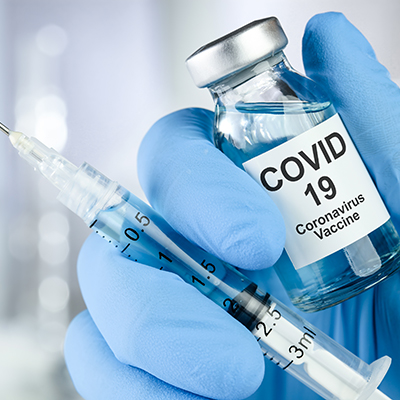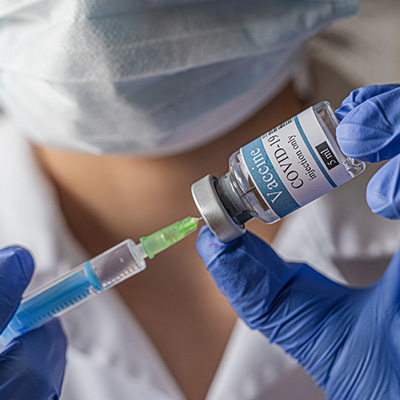January 4, 2021 -- COVID-19 vaccines currently approved for emergency use by the U.S. Food and Drug Administration (FDA) are safe even among people with food or medication allergies, according to allergists from Massachusetts General Hospital. A review of all relevant information was published in the Journal of Allergy and Clinical Immunology: In Practice on December 31.
To provide reassurance and support for vaccination across the U.S., the team of allergists sought to provide clear guidance to patients in accordance with recommendations by U.S. regulatory agencies.
Based on clinical trial data for both the Pfizer-BioNTech and Moderna vaccines, the authors noted a similarly low rate of allergic reactions to the COVID-19 vaccines. The rate of vaccine allergic reactions for the Pfizer-BioNTech vaccine was about 1.3 cases per 1 million people, while reactions occurred in less than 2% of trial participants for the Moderna vaccine.
Prior to the FDA emergency use authorization (EUA) of the Pfizer-BioNTech COVID-19 vaccine, the U.K. Commission on Human Medicines began its nationwide COVID-19 vaccine program. Within 48 hours there were two reports of severe allergic reactions in the U.K. that necessitated treatment with epinephrine.
This prompted the FDA to conduct a closer review of clinical data for each vaccine. One case of anaphylaxis and one case of drug hypersensitivity reaction were reported in the Pfizer-BioNTech vaccine trial, and two cases of delayed hypersensitivity reactions were reported in the Moderna trial (one of which was not likely due to vaccination).
In the Moderna trial, there were three lip/face swelling events one to two days after vaccination, but these occurred exclusively in patients with a history of dermal fillers. There were no anaphylactic or severe hypersensitivity reactions reported immediately after vaccination.
Like in the U.K., within a few days of the start of the U.S. COVID-19 vaccination program, there were several reports of allergic reactions to the vaccine. As of late December, there were 10 reported cases of allergic reactions to the Pfizer-BioNTech vaccine (out of more than 2 million administered doses) and two reports of a reaction to the Moderna vaccine in the U.S.
The current FDA EUA guidance for both vaccines is not to administer the vaccine to individuals with a known history of severe allergic reactions to any component of the vaccine. Furthermore, the U.S. Centers for Disease Control and Prevention (CDC) advises that all patients should be observed for 15 minutes after vaccination in order to identify and manage anaphylaxis.
The authors noted that allergic reactions to vaccines are not often attributed to active ingredients but rather to the inactive ingredients (excipients) such as egg protein, gelatin, formaldehyde, thimerosal, or neomycin. These ingredients are often added to strengthen immune responses, prevent contamination by bacteria, or stabilize the vaccine during transportation and storage.
Other excipients such as polyethylene glycol (PEG) improve the water solubility of vaccines and have been identified as a rare cause of allergic reactions to vaccines in the past. Notably, both the Pfizer-BioNTech and Moderna vaccines are formulated with PEG for stabilizing lipid nanoparticles containing messenger RNA (mRNA). There have been attempts to use safer alternatives, but the negative allergic outcomes are usually outweighed by the benefits of improved drug performance.
Many allergists have hypothesized that the cases of anaphylaxis during COVID-19 vaccine rollout could potentially be due to preexisting PEG allergy. However, the evidence supporting this theory to date is lacking. The authors explained that the measurement of serum tryptase, complement, and PEG antibodies could help elucidate the specific mechanism of drug-induced reactions following COVID-19 vaccinations.
The team of allergists proposed detailed advice so that individuals with different allergy histories can safely receive COVID-19 vaccines. They proposed having patients answer screening questions regarding their history of severe allergic reactions. If the patient answers yes to any of the questions, then they should be monitored for a longer period of time after vaccination or should consult with an allergist to evaluate risk of reactions with skin testing.
For patients who experience possible reactions to the first dose of a COVID-19 vaccine, the authors suggested that healthcare workers should prioritize determining whether an allergic reaction occurred and if the vaccine was responsible. They recommend skin testing for these patients and if the results are positive, then a second dose of the vaccine should be avoided.
"As allergists, we want to encourage vaccination by reassuring the public that both FDA-approved COVID-19 vaccines are safe," said Dr. Aleena Banerji, clinical director of the Allergy and Clinical Immunology Unit at Massachusetts General Hospital and associate professor at Harvard Medical School, in a statement. "Our guidelines are built upon the recommendations of U.S. regulatory agencies and provide clear steps to the medical community on how to safely administer both doses of the vaccine in individuals with allergic histories."
Do you have a unique perspective on your research related to immunology or vaccine development? Contact the editor today to learn more.
Copyright © 2021 scienceboard.net








